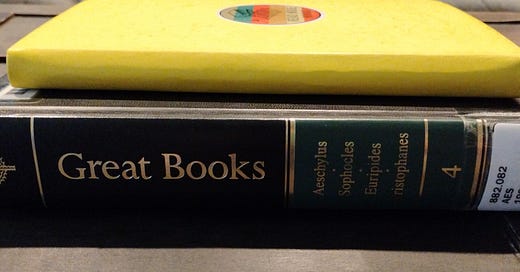Encountering the mind of the past: reflections on first reading Aeschylus & his Oresteia
Post 10 of series, Library-Educated: St. John’s College Great Books Challenge
As I sit with my library-loaned Great Books volume open to The Eumenides, I can’t help but recall the playbill—I wish I still had it—from a marvelous ‘90s-era Hamlet up in Portland, Oregon, whose cover text read something like:
Murder. Madness. Incest. A ghost (hero’s father) claiming to be murdered by his brother. Hero’s mother marries the murderer, the hero’s uncle. Hero stabs girlfriend’s father, thinking it’s his uncle. Girlfriend dies by suicide. Brother comes for revenge. Brother dies. Mother/aunt drinks poison. Hero kills uncle/father, then dies.
Suddenly your family seems normal.
First encountering Aeschylus, the “father of tragedy,” I realized that I was definitely not in Kansas anymore, even if allusions to these figures—e.g. the Furies—and others in the classical world are rife in my favorite Shakespeare and Dickens works. It helps to have just reread Homer, though. We are to some degree in familiar territory here, in the timeframe between The Iliad and The Odyssey, albeit with one of our least-sympathetic characters, Agamemnon.
However strange and elusive, this “father of tragedy,” Aeschylus, resonates today. Announcing the terrible news of the assassination of Martin Luther King, Jr in 1968 and relating it to the loss of his own brother, Robert F. Kennedy said to the crowd at his campaign rally:
“My favorite poet was Aeschylus. He wrote: ‘In our sleep, pain which cannot forget falls drop by drop upon the heart until, in our own despair, against our will, comes wisdom through the awful grace of God.’”
Aeschylus challenges us; and, it seems, he meant to.
In a delightful and informative YouTube conversation between Professor Joshua Billings of Princeton University and Professor Joseph Howley of Columbia University, the former argues that Aeschylus’s is the “most challenging” language of classical literature, even in translation. He advises that we shouldn’t “panic” if things don’t fall into place straightaway, and any translation that is too simple and accessible is probably not a particularly good one.
This has been my first real encounter with Aeschylus, and so I am writing this more as a “first impressions” piece, which hopefully will be followed up by another after I have more time and experience in this strange world. In the meantime, I thought it might be helpful to share here some of what I have learned as a beginner with Greek tragedy.
Keep reading with a 7-day free trial
Subscribe to Dispatches from Biblioll College to keep reading this post and get 7 days of free access to the full post archives.




